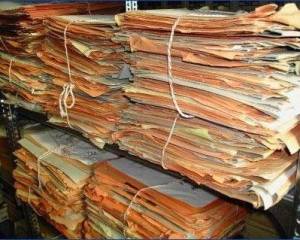Communist Head of Ukraine’s Archives would remove access to half of them

Head of Ukraine’s State Archive, Olha Ginzburg from the Communist Party has said that she would like to close half Ukraine’s archives. She was responding to a question about introducing European norms regarding archival openness. Ginzburg says that access to the archives is given to too wide a circle of people. The Radio Svoboda Ukrainian Service have, however, learned of cases where close relatives have been unable to get information about victims of Stalin’s regime.
Serhiy Semenko was shot in the Kryvy Rih Prison between 1944 and 1947. That is all that is known about the fate of one member of the national liberation struggle who was arrested together with his family and later shot by the communists, his descendant, Pavlo Podobyed recounts. He says that he is unable to find out any more about his great great grandfather because the State Archives give access only to children or Semenko’s sister, and they are no longer alive. He explains that he wants to know in order to go and light a candle in the place where his remains lie, yet they won’t tell him. They say that Serhiy Semenko’s children should find out yet their remains lie in the north of Russia where they were deported.
Olha Ginzburg says that the refusal is merely one case of a misunderstanding. She says that the archives are totally open though if she had her way, she would close access to half of them. They have opened up so much, she asserts, that the whole world comes and studies Ukrainian archives/
According to Yarynf Yasynevych, Project Director from the Research Centre of the Liberation Movement, practice shows that archive officers treat the concept of confidential information loosely and there is virtually no access to information about human rights infringements and victims of repression for researchers, and it is difficult for relatives.
She says that a survey the Centre carried out found that over 86 percent of researchers have encountered restrictions on access to information. Lower-ranking officials prefer to take no risks and decide that it’s better to not give access to documents. “The law gives them such a possibility, but they pay absolutely no heed to the public’s right to know and to relatives’ right to find out about victims and the right of historians to establish the names of those victims who have not yet been established.. People come to us who are looking for information about their relatives, who constantly run up against refusals, sometimes even on the pretext that the request is not quite correctly set out”. This, she notes, is despite the fact that the Public Information Act allows information requests to be set out in any form.
From a report at http://radiosvoboda.org/content/article/24465582.html





